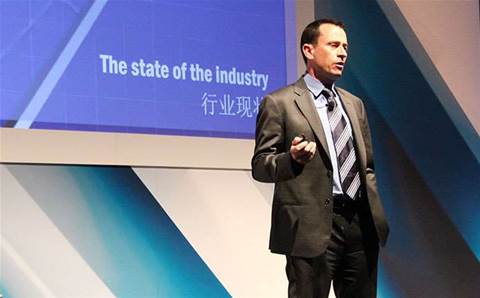Many of Australia's leading resellers, distributors and vendor representatives are preparing for the region's top channel conference, which kicks off in Bali on Tuesday 3 November.
Canalys Channels Forum APAC – now in its fourth year – will once again attract around 1,000 delegates from across Asia-Pacific to the highly targeted event.
Steve Brazier, chief executive of Canalys, said one of the conference's draw cards was its exclusive nature. "It is not our goal to grow the event. Every year we have [900-1,000 people]; we don't want to grow bigger than that. The reasons is we have a model that involves personal invitations. We don't allow walk-in customers. You can't register for a fee.
"What the vendors want in those two-and-a-half days is to meet with the important partners in the region. It is about quantity not quality. The strong recommendation we have is to keep a collegiate, personal feel," said Brazier.
[Who was at Canalys Channel Forum APC 2014?]
The Canalys conference model sees distributors invite a selection of partners to the event, which is this year sponsored by 20 vendors. CRN Australia has been a media partner of the event for the past three years, and is this year the only Australian channel magazine invited to the conference.
There are roughly 80 Australians making the trip, including representatives from the conference's keynote sponsors: Lenovo, HP, Microsoft, EMC and Dell. The Australian distributor partners are Ingram Micro, Westcon and Avnet. Last year, Australian delegates made up 12 percent of visitors.
Midmarket focus
Brazier said sponsors like the fact Canalys is heavily skewed toward midmarket resellers – while vendors have close ties to tier-one partners, it's harder to maintain lines of communication into the smaller end of the channel.
"The value of our event is to connect our vendors to the midmarket. The midmarket resellers have complained frequently that too much of the business is automated and they don't have the personal relationships. You can run the business 90 percent through dashboards and automation, but the partners want to know someone senior in the vendor so they can reach out if there is problem and get a solution," said Brazier.
[Who was at Canalys Channel Forum APC 2013?]
This year's attendees can expect a focus on the past year's trials and tribulations among the vendor community, among them some of the conference's top sponsors.
"The general trend is for the big industry titans to be struggling for growth and under pressure to cut costs and as a result the overriding theme has been focus and to get smaller. Obviously HP is a big example in term of splitting to get more nimble and faster but Symantec has done the same. Even Cisco has spun off their set-top box business and we wouldn't be surprised to see Cisco sell off a few non-core businesses," said Brazier.
The biggest deal in IT industry history – Dell's proposed acquisition of EMC – runs counter to that trend, he added.
"EMC is a pretty successful company but they are being frustrated by their activist shareholder and that is an unfortunate situation for a public company to be in. By most account, they are doing pretty well, over a three-year time scale their growth is pretty healthy and they really deserve a chance to work through their problems.
"They have also been punished by their shareholders for owning VMware despite creating an awful lot of shareholder value from VMware."
He said this was an "unfortunate" position for EMC, but like Dell, it could benefit from going private.
When companies like Dell and EMC undergo major transformations, they use the channel as a lever, said Brazier. Dell, for instance, had pushed for faster payments through its distributors in order to pay down the money to finance Michael Dell's 2013 privatisation play, and the same could happen now that it is saddled with a much greater loan to fund the US$67 billion EMC acquisition.
Brazier added that Dell's recent pivot toward the channel – a significant repositioning for the famously direct sales company – was made easier as a private entity. "What you can say is that the channel transformation they have undergone would have been very difficult without going private, because it produces choppy results."






_(21).jpg&h=142&w=230&c=1&s=1)
.jpg&h=142&w=230&c=1&s=1)
_(27).jpg&h=142&w=230&c=1&s=1)




.jpg&w=100&c=1&s=0)











